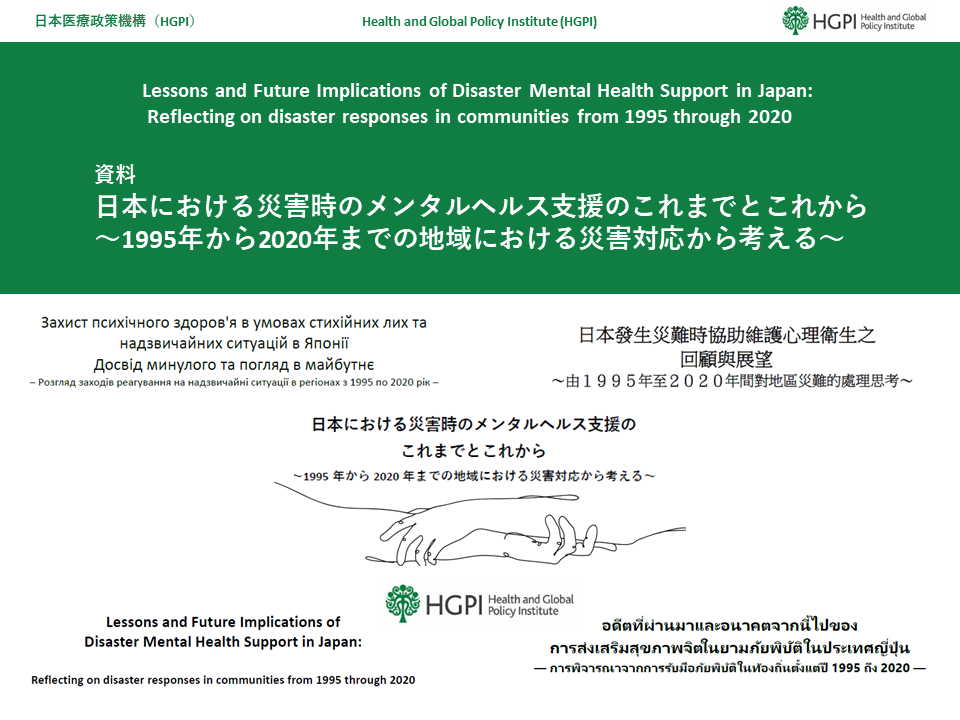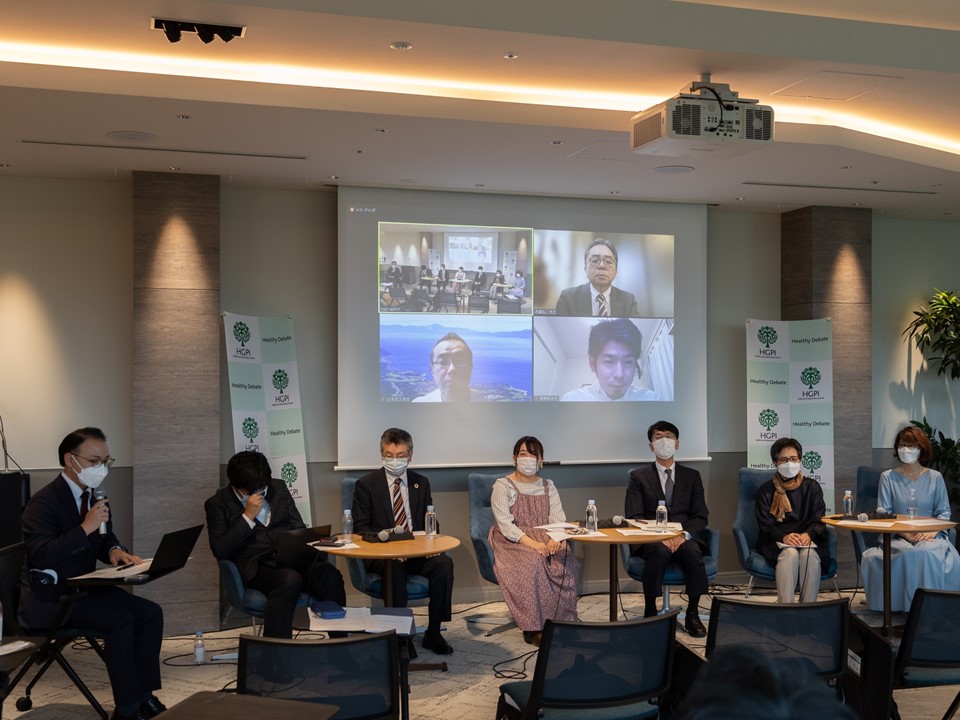[Activity Report] HGPI Mental Health Policy Project Presents Report on the State of and Future Approaches to Mental Health and Welfare Support Systems at Local Governments as Part of Ministry of Health, Labour and Welfare Project (May 18, 2022)
date : 5/26/2022
Tags: Mental Health
![[Activity Report] HGPI Mental Health Policy Project Presents Report on the State of and Future Approaches to Mental Health and Welfare Support Systems at Local Governments as Part of Ministry of Health, Labour and Welfare Project (May 18, 2022)](https://hgpi.org/en/wp-content/uploads/sites/2/mh-20220518-top-1.jpg)
Health and Global Policy Institute (HGPI) has published a report on its project titled, “Assessing the State of and Examining Future Approaches to Mental Health and Welfare Support Systems at Local Governments.” This project was conducted as part of the FY2021 Ministry of Health, Labour and Welfare Project for the Promotion of Comprehensive Welfare for Persons with Disabilities (Third Stage).
There are strong connections among mental health and various issues facing society, and the topic of mental health is growing more significant year by year. In the sixth revision of the Medical Care Plan in 2013, mental disorders were included as one of the four targeted diseases, showing that they have been designated as a key issue in healthcare policy. In particular, mental health and welfare measures are crucial when helping people rebuild their lives after humanitarian crises like the Coronavirus Disease 2019 (COVID-19) pandemic or major earthquakes, torrential rainfalls, and other natural disasters. The importance of developing communities with perspectives that encompass mental health, providing support for supporters, and connecting citizens who feel changes in their mental health to specialists has already been pointed out, and in addition to these topics, it is desirable for a seamless support system to be established that begins operating immediately after disasters and continues operating in the medium- to long-term. Teams specializing in immediate post-disaster mental health support called Disaster Psychiatric Assistance Teams (DPATs) were established after activity guidelines were formulated in 2013, and their activities continue to expand today. When it comes to medium- to long-term support after the acute phase, however, it is also necessary to consider the hazards or phenomena of the disaster and issues specific to the region, and disaster mental health and medical welfare measures based on standardized guidelines have yet to be established.
With the goal of enhancing municipal disaster mental health and medical welfare measures, we conducted a survey and hearings with local and prefectural governments and disaster relief organizations to examine how mental health and medical welfare systems operate immediately after disasters and in the medium- to long-term. In addition to analyzing the survey results, we also conducted hearings and an expert meeting with people involved in mental health as well as domestic and international specialists in this field. Through those activities, we sorted approaches and issues for medium- to long-term disaster response planning and formulated recommendations on preparations to make in mental health support for responding to future disasters. They have been compiled under the title of “Examples of and Recommendations for the Creation of Municipal Mental Health and Medical Welfare Systems for Medium- to Long-term Post-Disaster Response.”
When preparing this collection of examples, our experts felt that steps should be taken to avoid confusion in manuals and guidelines on disaster mental health and medical welfare, that the terms used in each document should be consistent, and that frameworks should be expanded when necessary. Therefore, in this project, each survey item was developed and analyzed based on previous studies conducted in disaster mental health and medical welfare, namely the “Disaster Mental Health Activity Guidelines: A Review of the Domestic and International Literature and a Vision for the Creation of New Comprehensive Guidelines,” which was developed during the “Study on Mental Health Care in Times of Disaster” conducted under the FY2016 Health and Labour Sciences Research Grants (Comprehensive Research for Persons with Disabilities in the field of mental disorders; Representative: Yoshiharu Kim (Director, National Information Center of Disaster Mental Health, National Institute of Mental Health, National Center for Psychiatry and Neurology (NCNP); and Director, Department of Adult Mental Health)); and the “Manual for Municipal Activities for Disaster Mental Health and Medical Welfare” (both the long and short versions), which was created as part of the “Study on Methods of Cooperation Among Disaster Dispatch Psychiatric Teams (DPATs) and Community Mental Health Systems,” conducted under the FY2020 Health and Labour Sciences Research Grants (Policy Research Project for Persons with Disabilities; Head researcher: Hirokazu Tachikawa (Professor, Disaster and Community Psychiatry, Faculty of Medicine, University of Tsukuba)). Regarding our framework for conducting the analysis, we arranged findings into eight categories below: “General Topics,” “Systems and Principles,” “Psychological Reactions and Treating High-Risk Individuals,” “Assessment,” “Risk Communication,” “Preparation and Training,” “Institutional Collaboration,” and “Special Cases.”
The survey results suggest the following key initiatives for municipalities to undertake to support disaster mental health and medical welfare in the medium- to long-term:
- Each municipality should share information regarding experiences with disasters and the results of responses taken with other municipal governments or relevant internal sections or departments and possess an awareness toward building face-to-face relationships during non-emergency periods.
- A collaborative system across various fields and disciplines that can provide manpower support to specialists in mental health must be built. Above all, when doing so, efforts must be centered around municipal public health nurses, who provide hands-on care to people during times of disaster.
A notable characteristic of this project was that people affected by mental health issues joined experts to hold discussions from the perspectives of the parties most affected. Below is an overview of the survey and results gathered during this project.
Overview of survey results on necessary post-disaster medium- to long-term support
General Topics
- Seventeen municipalities said they have “prepared plans and manuals for disaster mental health measures assuming responses over the medium- to long-term.” Manuals being used are related to “health and hygiene activities” and “mental health care.”
- Six municipalities say they “confirm there is consistency among disaster mental health support plans (prefectural) and relief plans (for each basic municipality).” Times these plans are used include when reviewing local disaster prevention plans or during disaster response coordinators’ organizational meetings.
- Incorporating external support in advance, before disasters occur, can enable efficient mental health support. (For municipal governments, this includes: needs assessments, individual support, group support, etc. while mental health care centers support municipalities and prefectural mental health centers provide overall backup.)
2. Systems and Principles
- Eighteen municipalities said they are “planning to establish new consultation services for disaster mental health and to inform citizens about those services.” In twelve municipalities, these consultation services are being established by Mental Health and Welfare Centers, making that the most common response.
- Disaster response efforts in recent years are also responding to regional issues by utilizing knowledge gained from disaster response in each region and through efforts like dividing roles among organizations according to support targets.
- Municipal public health nurses play central roles in supporting health for people affected by disasters.
- Municipalities must decide on support systems and standards to follow when withdrawing from disaster-stricken areas.
- Medium- to long-term disaster daily living support includes measures to combat depression, alcohol dependence, and suicide. Therefore, instead of providing mental health care as a form of support for people affected by disasters, communities should take up initiatives for mental health support.
- It is more desirable that functions of existing mental health care centers are enhanced instead of establishing new centers. When establishing new centers, plans that last until their closure are also necessary.
3. Psychological Reactions and Treating High-Risk Individuals
- Four municipalities said they “have implemented or are planning to implement mental health support for people with specified attributes.” These include people who are identified as requiring support during evacuation (such as elderly people or people with disabilities).
- Certain groups such as elderly people who are not covered by the Long-Term Care Insurance Act or people with alcohol use disorder are more likely to be isolated and are more difficult to connect to support, and responding to them requires supporters to possess high response capacities.
- Mental health support must consider how disasters affect groups like women or people who are LGBTQ.
4. Assessment
- Eighteen municipalities said they are “making plans to raise awareness for medium- to long-term disaster mental health support among citizens.” The activities will include distributing fliers and notices on mental health care and consultation services to citizens affected by disasters, publicizing information on municipal websites, and providing health consultations.
- Twenty-two municipalities said they are “planning outreach activities aiming to provide medium- to long-term disaster mental health support to citizens.”
- When interview surveys were conducted at evacuation centers, the task of conducting them was split among public health nurses from the disaster-stricken areas and public health nurses who came from other areas as backup.
- The issues faced by people affected by disasters change over the medium- to long-term. The type of housing also has an impact on mental health. For example, some people “felt left behind and secluded, or had depressive tendencies” after being placed in temporary housing and experiencing delays in reconstruction. Among people staying in assigned temporary housing, which disperses disaster victims, some felt “difficulty sharing feelings among people affected by the disaster.”
5. Risk communication
- Mental Health Care Countermeasure Committees have been started from existing committees and include parties like professors of psychiatry from universities, presidents of psychiatric hospital associations, professional associations, mental health social workers, clinical psychologists, and representatives from major healthcare institutions in the prefecture.
- In the event of disaster, committees presided over by public health centers that discuss community health and psychiatric health affairs during non-emergencies have discussions that focus on disaster relief.
- It is desirable that opportunities for multiple organizations and multi-professionals to meet such as Psychiatric Emergency System Coordination Committees are used to consider and plan in advance, during non-emergencies, administrative structures and other topics related to mental health from the period immediately after a disaster to the medium- to long-term.
6. Preparation and Training
- Thirty-two municipalities said they are “implementing or are planning to implement education and training programs for supporters who provide mental health support to citizens.”
- Eighteen municipalities said they are “implementing or are planning to implement education and training programs on the mental health of supporters.”
- The parties at the frontline of post-disaster mental health support are municipal public health nurses, so plans that are premised on the activities of municipal public health nurses are necessary.
- Sharing stories and experiences from people who have experienced disasters is useful for accumulating knowledge regarding the medium- to long-term period after disasters.
- Content that should be included in training programs includes gatekeeper training, mental health for administrative staff, and psychological first aid (PFA). For example, the National Information Center for Stress and Disaster Mental Health at the National Center of Neurology and Psychiatry is providing PFA training.
- It is also important for municipal governments to encourage citizens to help each other in times of disaster. To achieve this, it will be important to make efforts during non-emergencies to encourage connections among citizens (in other words, creating environments where community members can help each other during emergencies), particularly from people like those who work at places community members use regularly, neighborhood association directors, and welfare committee members.
7. Institutional Collaboration
- Twenty-six municipalities said they have organizations that they plan to collaborate with or think they can collaborate with for disaster mental health response. When asked which organizations, twenty-three municipalities said “healthcare institutions (including psychiatric day care facilities and similar facilities).”
- Seventeen municipalities said they are planning collaborative efforts during non-emergencies by responsibility sharing, human resource development, and making arrangements among organizations in anticipation of collaborating with various parties like psychiatric professional associations, administrative agencies, educational institutions, and health and medical welfare organizations.
- It is important to share information that is based on public health nurses’ activities and feelings.
- It is important to establish face-to-face relationships within organizations (among departments) and among municipal governments during non-emergencies. Being able to meet with prefectural governments or health centers about once every three months can enable collaboration in times of emergency.
- It is important for related parties from healthcare institutions, public health centers, and municipal health centers to participate in DPAT training and similar programs. Doing so will also build recognition toward receiving support.
- In many cases, it is impossible to address issues related to mental health through a single department. Meetings involving people in health and welfare-related occupations must be held on a regular basis.
- Many community members want to hide problems related to mental health or do not want others to know about them, so some people use healthcare institutions and support organizations outside of their communities. It is desirable that regular meetings are held in which municipalities engage in wide-ranging cooperation that spans local communities, especially those that have been affected by disasters, to prefectural governments or beyond prefectural boundaries so information on methods for responding to these citizens can be shared and so support across wide areas can be provided.
8. Special Cases
- There have been cases of isolation that required long-term post-disaster support among people who were the last ones in temporary housing or who lost their jobs or developed alcohol use disorder while staying in public temporary housing.
Opinions from people affected by mental health issues regarding necessary post-disaster medium- to long-term support
- Leading with the words “mental health care,” “mental,” and “psychiatry” will help build acceptance toward mental health professionals working together behind the scenes to support people who have been affected by a disaster but are hesitant to receive care. Steps must be taken to dispel feelings of resistance toward mental health among citizens.
- People require places of belonging where they can enjoy being part of society and they need people who will stay close to them.
- It will be important to collect information on efforts and services from municipal governments that have proven useful for people with mental health issues who have experienced large-scale disasters and to share that information among municipal governments. It will also be important to make active use of peer support and other activities that allow people affected by mental health issues to engage in mutual support and that connect them with mental health professionals.
For details, please see the PDF linked at the bottom of this page.
*Please note that for the time being, the project report is available in Japanese only
Top Research & Recommendations Posts
- [Policy Recommendations] The Path to a Sustainable Healthcare System: Three Key Objectives for Public Deliberation (January 22, 2026)
- [Research Report] Perceptions, Knowledge, Actions and Perspectives of Healthcare Organizations in Japan in Relation to Climate Change and Health: A Cross-Sectional Study (November 13, 2025)
- [Research Report] The 2025 Public Opinion Survey on Healthcare in Japan (March 17, 2025)
- [Policy Recommendations] Reshaping Japan’s Immunization Policy for Life Course Coverage and Vaccine Equity: Challenges and Prospects for an Era of Prevention and Health Promotion (April 25, 2025)
- [Research Report] The 2023 Public Opinion Survey on Satisfaction in Healthcare in Japan and Healthcare Applications of Generative AI (January 11, 2024)
- [Research Report] AMR Policy Update #4: Cancer Care and AMR (Part 1)
- [Policy Recommendations] Developing a National Health and Climate Strategy for Japan (June 26, 2024)
- [Public Comment Submission] “Assessment Report on Climate Change Impacts in Japan (Draft Overview)” (December 24, 2025)
- [Research Report] Survey of Japanese Physicians Regarding Climate Change and Health (December 3, 2023)
- [Research Report] The Public Opinion Survey on Child-Rearing in Modern Japan (Final Report) (March 4, 2022)
Featured Posts
-
2026-01-09
[Registration Open] (Hybrid Format) Dementia Project FY2025 Initiative Concluding Symposium “The Future of Dementia Policy Surrounding Families and Others Who Care for People with Dementia” (March 9, 2026)
![[Registration Open] (Hybrid Format) Dementia Project FY2025 Initiative Concluding Symposium “The Future of Dementia Policy Surrounding Families and Others Who Care for People with Dementia” (March 9, 2026)](https://hgpi.org/en/wp-content/uploads/sites/2/dementia-20260309-top.png)
-
2026-02-05
[Registration Open] (Webinar) The 141st HGPI Seminar “Current Status and Future Prospects of Korea’s Obesity Policy: Voices of People with Lived Experience in Policy Promotion” (March 3, 2026)
![[Registration Open] (Webinar) The 141st HGPI Seminar “Current Status and Future Prospects of Korea’s Obesity Policy: Voices of People with Lived Experience in Policy Promotion” (March 3, 2026)](https://hgpi.org/en/wp-content/uploads/sites/2/hs141-top-1.png)
-
2026-02-06
[Research Report] AMR Policy Update #5: Cancer Care and AMR (Part 2)
![[Research Report] AMR Policy Update #5: Cancer Care and AMR (Part 2)](https://hgpi.org/en/wp-content/uploads/sites/2/HGPI_20260204_AMR-Policy-Update-5.png)








